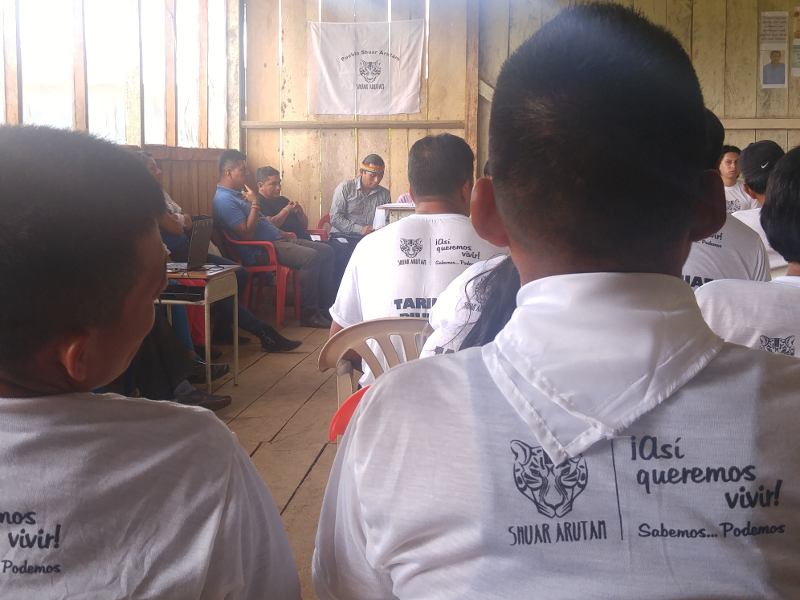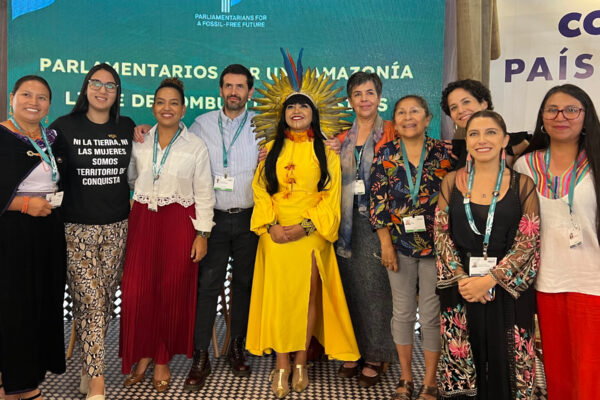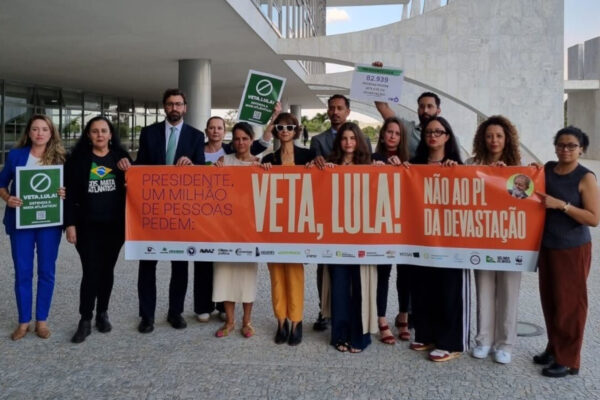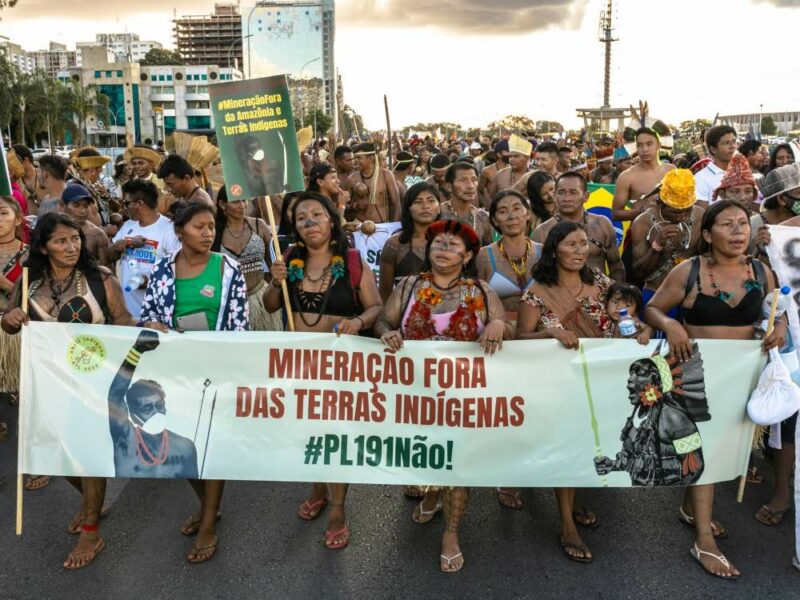Between April 21st and 23rd, the Shuar Arutam Nation (PHSA for its Spanish acronym) carried out its 14th assembly. Assemblies are always important moments for the organization, serving as a time to get up-to-date on the various activities of the Governing Council, an opportunity to analyze reports, and a space to discuss and debate improvements and new initiatives. Even so, the issue of greatest importance during this year’s assembly was the threat faced by the PSHA from extractive industries.
The Shuar Arutam nation is composed of 60 communities of about 6,000 members whose territory covers an area of 190,000 hectares (nearly 470,000 acres) in the Condor mountain range along the Ecuador-Peru border. Those mountains house an ecosystem of great biological importance given the high levels of endemic species of flora and fauna. They also hold the headwaters of an important river network including the Santiago, Zamora and Coangas Rivers and innumerable waterfalls of great importance to the Shuar’s cosmovision because their highest deity, Arutam, lives in those waterfalls. For this reason, they are known as the People of the Waterfalls.
Shuar territory in dispute
The Shuar are facing a great threat given the fact that the Ecuadorian government has sold concessions to part of their territory for an open-pit copper mining project known as San Carlos-Panantza run by the company Explocobres S.A. (EXSA), a subsidiary of the Chinese companies CRCC and Tongling. The project consists of thirteen mining blocks and covers an area of 41,700 hectares (103,000 acres).
In August 2016, a police and military operation with over 2,000 personnel descended upon the community in Nankints to evict eight families – 32 people – at the request of the company, which claims to have legal title to the land. However, those titles were granted between 2000 and 2006, while the Shuar claim that the lands are, and have been, in their ancestral possession.
The ten homes of the Nankits inhabitants were destroyed with bulldozers and replaced with EXSA’s camp. The displaced families took refuge with family and friends in the community of Santiago de Panantza, but their situation was precarious because they lacked adequate clothing and provisions for subsistence; they had lost everything.
In December 2016, in a desperate attempt to save their community, a Shuar group tried to occupy the mining camp, leading to confrontation with police and military officials. As a result, a policeman was killed and several Shuar and police were wounded. This unfortunate situation caused the President of the Republic to declare a martial law in the province of Morona Santiago. This action limited the rights to privacy in one’s home, peaceful gatherings, freedom of association, and free mobility. Furthermore, a large military contingent was deployed in the province, concentrated in areas of proximity to the mining camp and surrounding Shuar territory.
The military presence led to new displacements of Shuar communities in Tsuntsuim, San Pedro, and Kutukus, located in the area surrounding Nankints. Those families had to leave everything behind and move to the community of Tink, located in an average of 15 km to the south. There are now 35 families who have been displaced – more than 150 people whose lives have been completely disrupted because of deprivation of proper homes and loss of farmland on which their livelihoods depend.
On February 14th, the declaration of martial law ended after two months of being in effect. Nonetheless, the authorities indicated that in order to be able to respond to any events, they would not remove the troops from occupied areas. This looming military presence prevents the communities from returning to their land.
Another result of the declaration of martial law are the criminal investigations that have been opened against more than 60 indigenous leaders and farmers, and that led to the arrest of Agustin Wachapá, President of the Interprovincial Federation of the Shuar Center (FICSH), when the police broke into the offices of the organization on December 21st, 2016. After being detained for 124 days in a high security prison, he was released on a $6,000 bail on April 24th, 2017. However, the legal process against him continues. At his release, Wachapá expressed “the fight of indigenous peoples continues,” and that he “will continue fighting against the mining industries in their territories and for their rights”.
The organization reunites
The assembly in late April was the first reunion of Shuar communities after the start of the conflict with the mining company and military officials in their territories. Under normal circumstances PSHA leaders usually have monthly coordination meetings in which they give quarterly activity reports to their communities.
Given what had happened in the past months, however, there was a lot of uncertainty about where people would convene. Shuar leaders and their communities would have to opt for a place that would guarantee a normal progression of the meeting.
To resolve this problem, the PSHA chose one of its farther communities, located in the Condor Mountain Range, as its meeting place. Its name, Numpatkaim, which means “river of blood,” alludes to the reddish color of the Coangos River takes on from the clay on its banks. This selection presented a logistical challenge because the only way for the furthest communities to arrive there had to be by plane and the closer communities had to walk for an average of four hours. In my case I had to travel seven hours from the city of Quito all the way to Macas, to later take a plane that traveled 110 kilometers between the steep slopes of the Condor Mountains, continuing on the course of the Coangos River.
I have had the privilege of working with indigenous communities for over ten years, focusing on, among others, organizational strengthening and capacity building for indigenous peoples about their rights and the investigation of incidents in which extractive projects violated those rights. Although this has required me to travel extensively in the Amazon, I have never had to go so deep into the Condor Mountain range, which for me was a moment of high expectation, even more so because this was my first mission as Amazon Watch Coordinator of Land in Ecuador, a role I have had only since January 2017.
This is how we want to live!
Despite logistical difficulties, there was a great amount of participation: leaders of 47 PSHA communities attended, as well as representatives of the Shuar Federation (FICSH), the Confederation of Indigenous Nationalities of the Ecuadorian Amazon (CONFENIAE), and the Confederation of Indigenous Nationalities of Ecuador (CONAIE).
In entering the communal area where the meeting took place, the sense of unity became clear to me when I noticed that every delegate from PSHA wore a white t-shirt with the organization logo on the front and the slogan Tarimiat Pujustin or “Living Well” on the back, accompanied by “This is how we want to live! We know. We can.” Minutes after I got settled in, a Shuar brother came to me and gave me one of the shirts, asked me to wear it, and said, “We want everyone to leave with this message.”
The Tarimiat Pujustin is a concept, a series of principles that defines the harmonious life between nature and the Shuar, a way of living that they have been practicing ancestrally and on which the conservation of the ecosystems they live in depends. 92% of the Shuar Arutam territory still holds its tropical forest intact. This, along with the lives of the Shuar peoples, who largely depend on the forest to sustain themselves through hunting, fishing, harvesting, and cultivating, has been gravely impacted by the development of a large scale mining project. Because of this, their message must be heard more than ever.
The indigenous authorities that were invited focused directly on this context, putting an emphasis on the importance of unification among these organizations in order to face this difficult situation, and in carrying out the mandate of the communities to defend indigenous rights and territories. The president of the PSHA, Vicente Tsakim, concluded the discussion saying, “let’s all come together to defend our territory and our organization. Our rights that protect our territory and the Constitution must be respected.”
Under the banner of this goal presented by the Shuar, Amazon Watch provides support in coordination with the PSHA Government Council. We carry out capacity-building activities, communication support, and advocacy before international human rights organizations such as the Inter-American Human Rights System and the United Nations. This work has been made possible in alliance with the work team of the Tiam Foundation, whose Executive Director is Mario Melo, long-time lawyer in defense of the rights of indigenous peoples.



















